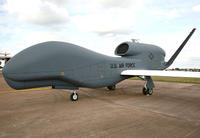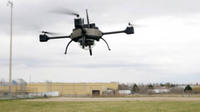-
Pentagon: Global Hawk Drone “not operationally effective”

The Pentagon has declared the latest Northrop Grumman Global Hawk drone “not operationally effective”; according to a report by the Pentagon’s weapon testers, the RQ-4B Global Hawk Block 30 could only provide 40 percent of the coverage requested; “Mission-critical components fail at high rates, resulting in poor takeoff reliability, high air abort rates, low mission capable rates, an excessive demand for critical spare parts and a high demand for maintenance support”; Pentagon officials declined to discuss the drone in too much detail but did say that they were working with Northrop Grumman to make improvements to the drone; defense officials have scheduled a production meeting for this month to discuss the program
-
-
Imation acquires MXI Security
The cost of data breaches continues to rise annually, with the average organizational cost of a breach reaching $7.2 million in 2010; by 2014, the market for secure data solutions — protecting against data loss, theft, or breach — specifically designed to address secure portable storage, digital identity, and secure portable computing is expected to reach more than $4.5 billion; Imation, a major player in the field of secure data, further strengthens its offerings by acquiring the assets of MXI Security; the move is a continuation of Imation’s strategy of investing in key technology platforms to meet customers’ needs
-
-
Smiths Detection wins two government contracts
The Department of Defense (DoD) recently awarded Smiths Detection a $30 million contract to supply the military with chemical detection devices; under the contract Smiths Detection will provide its newly enhanced M4A1 JCADs, a portable detection device that weighs less than two pounds and warns of the presence of any dangerous chemical warfare agents or toxic chemicals; Smiths Detection also received a 16 million Euro contract from the German Federal Ministry of Finance to provide X-ray scanners for cargo systems
-
-
QinetiQ's OptaSense to protect India's major oil pipeline

The 670 km Mangala Development Pipeline (MDP) is the world’s longest continuously heated and insulated pipeline; it will have access to 75 percent of India’s refining capacity; the company operating it will install QinetiQ’s OptaSense technology to secure the pipeline; OptaSense system is designed to detect, classify, and locate potential threats to buried pipelines
-
-
FBI leads Lockheed Martin cyberattack investigation

The FBI recently announced that it is leading a federal investigation into a cyberattack on defense giant Lockheed Martin’s networks; the investigation will be led by the National Cyber Investigative Joint Task Force and is aimed at determining if the attack was a result of “poor hygiene, if nothing was infiltrated and nothing taken or something more”; on 21 May, the company detected a “significant and tenacious” attack on its networks that was met with a swift response; the FBI declined to comment on what actions it would take if the investigation revealed that the attacks were perpetrated by state or non-state actors
-
-
SBInet: dismal failure // from Lee Maril, Ph.D.

SBInet was a dismal failure — at a cost of more than $1 billion to the American taxpayer; the public deserves much better than DHS has given us along the Mexican border, including a fair and objective investigation of Boeing’s waste of taxpayer’s money in hard economic times
-
-
Envisage Technologies to provide Indiana DHS with software
On Wednesday Envisage Technologies announced that it was working with the Indiana Department of Homeland Security (IDHS) to implement the third phase of its state-wide readiness strategy; Envisage will expand its Acadis Readiness Suite, an integrated software tool that automates complex logistical tasks that normally require a host of various databases, software, and systems, to include secure certification of users; state officials say that the added software capabilities will help agencies more accurately assess resource needs and respond more quickly in emergencies
-
-
New business: guided border tours
The increased attention to the security of the U.S.-Mexico border has caused many Americans to want to see for themselves what is going on along the border; this gave Tucson, Arizona-based Gray Line an idea, and the “Border Crisis: Fact and Fiction” tour is the result; the guided tour takes passengers to various points along the Arizona part of the U.S.-Mexico border; the trips will be offered twice a month, or upon request for large groups; the all day tours, which include lunch, cost $75 per person
-
-
Portable iPod Touch fingerprint scanner launched
IPod Touch users can now turn their devices into a portable fingerprint scanner; last week, Fulcrum Biometrics unveiled its new FbF mobileOne biometric fingerprint reader and software for the iPod touch; using the Touch’s standard dock connector, the mobileOne device can scan and match fingerprints on the iPod or send it wirelessly to a remote server for authentication
-
-
Drug violence causing U.S. firms to reconsider Mexican investments

As the Mexican government’s battle against drug cartels rages on, U.S. businesses and their employees have become increasingly caught up in the crossfire, which has led many to reconsider investing in Mexico; a recent survey of U.S. companies by the U.S.— Mexico Chamber of Commerce found that only half were planning on moving ahead with investment plans in Mexico; U.S. companies and their workers have become increasingly caught up in the war as collateral damage as well as targets for kidnapping and extortion; in 2010 one out of ten companies reported kidnappings and 60 percent said that their employee had been beaten or threatened by the cartels
-
-
HHS awards SIGA Technologies smallpox contract worth up to $2.8 billion
New York-based SIGA Technologies has signed a 5-year, $433 million contract with the U.S. Department of Health and Human Services (HHS) to deliver two million courses of the company’s smallpox antiviral, ST-246, to the Strategic National Stockpile; the contract includes options that would raise the contract’s total value to approximately $2.8 billion if these options are fully exercised
-
-
Is Google's Chromebook impervious to viruses?

In a potential blow to the antivirus industry, Google recently announced the release of a series of laptops which the company claims to be so secure that there is no need to buy antivirus software; Chromebooks are designed to run nothing but a browser, which means nothing can be installed on the computer itself; with no executable files to be installed that also means antivirus and the malicious code it protects against have no room on the laptop; but, not all analysts are convinced that Google’s Chromebook is as secure as they claim; this move to a cloud based computer could signal a broader shift that could hamper the antivirus industry’s future prospects
-
-
Don't mess with these Orlando mall cops
Far from being a piecemeal operation, security at The Mall at Millennia, a luxury mall in Orlando, Florida, is a highly sophisticated operation that uses the latest law enforcement tools, techniques, and technology; 50 unarmed security officers maintain a conspicuous presence throughout the 1.2 million square foot mall; the mall also has a comprehensive network of surveillance cameras that are monitored in a twenty-four hour command center; to prepare security personnel for emergency scenarios, the department conducts tabletop exercises with local law enforcement officials every six months; the mall also works closely with local law enforcement officials to catch local thieves and participates in sting operations
-
-
Students develop better security system for retailers
Northeastern University student-researchers have created technology designed to gather more meaningful information on customer habits, inventory, and fire safety in retail stores such as CVS, Stop & Shop, and The Home Depot; the students used the university library as a mock retail store; the technology they developed displays all of the information — including the location of books, computers, and fire alarms — on digitized heat maps with geographic coordinates; the system could make for a strong fire safety application
-
-
Quadrotor micro UAVs go mainstream

A Canadian company develops small quadrotor micro UAVs for use by law enforcement, first responders, and the military; the company’s Scout has a range of three kilometers and maximum speed of 50 kilometers per hour; it can fly through wind gusts of up to 80 km/h, and can cope with harsh weather conditions; the Scout is light — it weighs about one kilogram — and can be carried disassembled in a case and be assembled quickly by snapping its rotors into the main body
-
- All
- Regional
- Water
- Biometrics
- Borders/Immig
- Business
- Cybersecurity
- Detection
- Disasters
- Government
- Infrastructure
- International
- Public health
- Public Safety
- Communication interoperabillity
- Emergency services
- Emergency medical services
- Fire
- First response
- IEDs
- Law Enforcement
- Law Enforcement Technology
- Military technology
- Nonlethal weapons
- Nuclear weapons
- Personal protection equipment
- Police
- Notification /alert systems
- Situational awareness
- Weapons systems
- Sci-Tech
- Sector Reports
- Surveillance
- Transportation
Advertising & Marketing: advertise@newswirepubs.com
Editorial: editor@newswirepubs.com
General: info@newswirepubs.com
2010-2011 © News Wire Publications, LLC News Wire Publications, LLC
220 Old Country Road | Suite 200 | Mineola | New York | 11501
Permissions and Policies
Editorial: editor@newswirepubs.com
General: info@newswirepubs.com
2010-2011 © News Wire Publications, LLC News Wire Publications, LLC
220 Old Country Road | Suite 200 | Mineola | New York | 11501
Permissions and Policies
